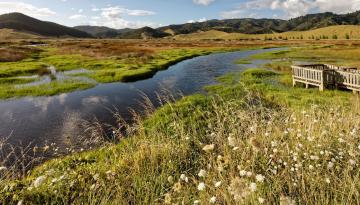As renewed community transmission of COVID-19 brings more uncertainty to New Zealand, Federated Farmers insist now is not the time to bring in new legislation signed off earlier this year.
The lobby group says the passing of both the Emissions Trading Scheme (ETS) and new freshwater rules are set to have a significant impact on farmers.
Andrew Hoggard, president of Federated Farmers, says with the economy already stretched to the limit in the wake of the first COVID-19 lockdown, the last thing farmers need right now is more rules and regulations to make sense of and grapple with.
Climate Change Minister James Shaw called the ETS one of the most effective tools the country had for reducing climate-polluting emissions when he announced the passing of the legislation in June.
But Federated Farmers expressed "serious concerns" with the bill, saying it incentivises the acceleration of productive farmland being converted to pines planted for carbon credits.
"Those that think that we agreed to go into the ETS couldn't be more wrong," Hoggard told Dominic George on Magic Talk's Rural Today on Monday.
Hoggard also said the group had worries about the new freshwater rules, which introduced a new national policy statement, a national environmental standard and stock exclusion regulations prohibiting the access of cattle, pigs and deer to freshwater.
"Our team's sort of getting their head around it more and more each day and probably getting more concerned each day."
Some specific concerns cited by Federated Farmers were around the stock exclusion rules, which require farmers to prohibit stock from entering specified wetlands, lakes and rivers more than 1m wide. Stock is also not allowed on land that is closer than 3m to the bed of rivers or lakes.
The group also said the new rules would lead to rising costs for fencing in the high country.
"I've already heard a few farmers talking about 'well it's just going to be easier to plant the place out in trees than deal with all of this' - so it's a real concern."
Hoggard also said new rules around winter grazing were concerning.
"Farmers are only a few months away from planting for next winter and there's potential all these rules are going to apply and requirements for consents, farm plans and so on, which haven't even been developed yet, which they'll need to have if they actually want to graze those crops off next winter," said Hoggard.
"That creates a hell of a lot of uncertainty. So we're trying to sort out what the hell's going on there, make sure everything is practical and that there is a pathway forward, for the short term anyway, so people can, with confidence, plant crops."
Hoggard said the new legislation brought even more uncertainty for farmers.
"[Uncertainty] is the last thing anyone needs right now when they're having another flare up of COVID.
"We don't know how bad this is going to be, how much of an impact it's going to have on the economy - it just seems ridiculous to be rushing through legislation that in some incidences we feel is pretty badly worded and could result in a hell of a lot of court costs, etc, and potential for farmers to go backwards. It makes no sense at this time."


